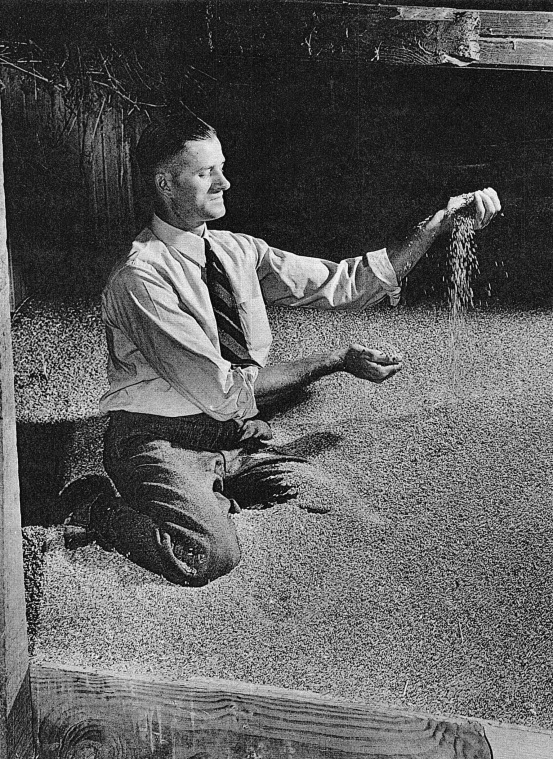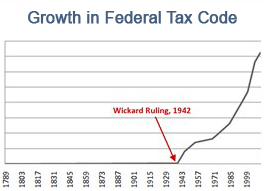
WICKARD V. FILBURN

The mission of The Filburn Foundation is to educate the public about an important Supreme Court case – Wickard v. Filburn 317 U.S. 111 (1942) – which greatly increased the power of the federal government to regulate economic activity.
The Wickard v. Filburn case was one of the most important and tragic moments in American history. It changed the role of the Federal government in American life. Most Americans had never even heard of Wickard v. Filburn including the community in which this historic case originated.
In this case, the U.S. Supreme Court found the Commerce Clause can apply to local, non-commercial activity which might affect interstate commerce and has the authority to regulate private economic activity.

We invite you to explore this website and learn about Roscoe Filburn, pictured to the left, and his fight which took him all the way to the U.S. Supreme Court back in 1942.
We are thankful for so many others who have written about and preserved this history. If you have information that you would like to share, please contact us.
Summary of Wickard v. Filburn, 317 U.S. 111, 63 S. Ct. 82, 87 L. Ed. 122 (1942)
Petitioner/Appellant: Claude R. Wickard, U.S. Secretary of Agriculture
Chief Lawyers for the Petitioner/Appellant: Francis Biddle, U.S. Attorney General and Charles Fahy, U.S. Solicitor General
Defendant/Appellee: Roscoe C. Filburn
Lawyers for Appellee: Webb R. Clark, Harry N. Routzohn, and Robert S. Nevin of Dayton, OH
Filed: March 27, 1942
Argued: May 4, 1942
Reargued: October 13, 1942
Decided: November 9, 1942 (Stone Court)
Opinion: Justice Robert H. Jackson
Dissenting Judges: None

Facts
The Agriculture Adjustment Act of 1938 (AAA) set quotas on the amount of wheat put into interstate commerce and established penalties for overproduction. The goal of the Act was to stabilize the market price of wheat by preventing shortages or surpluses. Filburn (P) sold part of his wheat crop and used the rest for his own consumption. The amount of wheat Filburn produced for his own consumption combined with the amount he sold exceeded the amount he was permitted to produce.
Secretary of Agriculture Wickard (D) assessed a penalty against him. Filburn refused to pay, contending that the Act sought to limit local commercial activity and therefore was unconstitutional because it exceeded the scope of Congress’s power under the Commerce Clause.
Filburn brought this lawsuit seeking to enjoin enforcement of the Act and a declaratory judgment that the wheat marketing provisions of the AAA were unconstitutional for exceeding the scope of Congress’s commerce power. The court below, a district court panel of three judges, entered judgment for Filburn and the Supreme Court granted cert.
Issues
1. Can Congress regulate the production of wheat intended for personal use and not placed in interstate commerce?
2. Can Congress regulate trivial local, intrastate activities that have an aggregate effect on interstate commerce via the commerce power?
Holding and Rule (Jackson)
1. Yes. Congress can regulate the production of wheat intended for personal use and not placed in interstate commerce.
2. Yes. Congress can regulate trivial local, intrastate activities that have an aggregate effect on interstate commerce via the commerce power, even if the effect is indirect.
The wheat marketing quota and attendant penalty provisions of the AAA, even when applied to wheat not intended in any part for commerce but wholly for consumption on the farm, are within the commerce power of Congress. The power to regulate interstate commerce includes the power to regulate commodity prices and practices affecting them.
The effect of the AAA is to restrict the amount of wheat which may be produced for market and the extent to which one may avoid resorting to the market by producing for his own needs. That the production of wheat for consumption on the farm may be trivial in some cases is not enough to remove the grower from the scope of federal regulation where the aggregate effect of such behavior by many others is far from trivial.
Wheat grown for home consumption is a factor with great volume and variability and it would have a substantial influence on price conditions. When prices are high the wheat may flow into the market and check price increases. Furthermore wheat grown for personal consumption supplies the need of the grower who would otherwise purchase wheat in the open market.
Disposition
Reversed.
